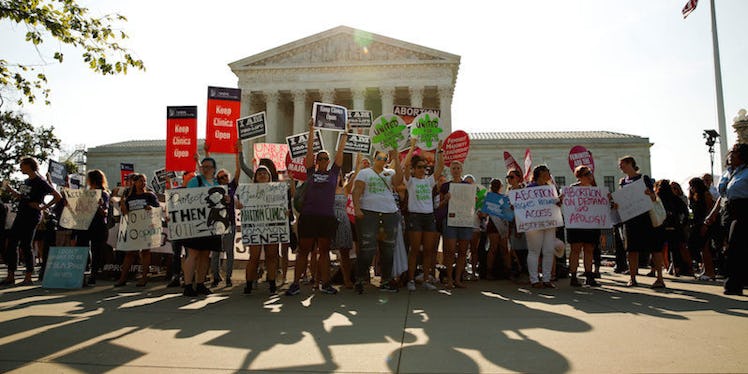
The Supreme Court Just Made A Decision On The Biggest Abortion Case In Decades
The Supreme Court just announced its decision in Whole Woman's Health v. Hellerstedt, the biggest case about abortion in decades.
The Supreme Court ruled the law that closed down more than half of Texas's abortion clinics unconstitutional; the law will no longer stand.
This is a major win for pro-choice advocates as it takes away states' abilities to restrict women's access to abortions.
Texas House Bill 2 said abortion clinics had to meet the requirements of an ambulatory surgical center and abortion providers had to have admitting privileges at hospitals.
Both of these requirements have been called medically unnecessary for the generally safe abortion procedure by the American Medical Association and The American College of Obstetricians and Gynecologists.
Before House Bill 2 became law, there were 41 abortion clinics in Texas. Since then, over half have had to close. With the full effects of House Bill 2, there would have been just nine left in the state. Now, the closed clinics have the opportunity to reopen and serve women, although it would take considerable time and money.
Whole Woman's Health is an organization providing abortions at several locations. It fought the state of Texas, saying this law only served to take away abortion access rather than to keep women safe.
Abortion has been a constitutionally protected fundamental right in the United States since the Supreme Court ruled in Roe v. Wade in 1973. In the 1992 case Planned Parenthood v. Casey, the Supreme Court further ruled it is unconstitutional to put an "undue burden" on women seeking abortions.
By forcing clinic closures, Whole Woman's argued Texas took away that right by placing an undue burden on women.
The Supreme Court agreed. As Justice Sonia Sotomayor said during arguments in March,
You can't have a law that has marginal, if any, medical benefit be applied to this procedure anywhere where there's an undue burden on people – on women.
Justices Sonia Sotomayor, Ruth Bader Ginsburg, Elena Kagan, Stephen Breyer and Anthony Kennedy sided with Whole Woman's Health while Justices Clarence Thomas, Samuel Alito and John Roberts sided with the state. Breyer wrote the opinion.
Laws similar to Texas House Bill 2 have sprung up across the United States, especially in the south. Several other states have considered requiring ambulatory surgical centers and hospital-admitting privileges for abortion providers.
Louisiana passed a law requiring admitting privileges which would have caused three out of four clinics to shut down. The Supreme Court suspended the law in March until it reviewed this case from Texas.
This ruling for Whole Woman's Health v. Hellerstedt sends a message that these laws will not stand under legal scrutiny. It sends a message that women's fundamental rights cannot be stripped.